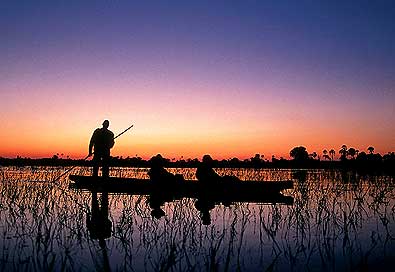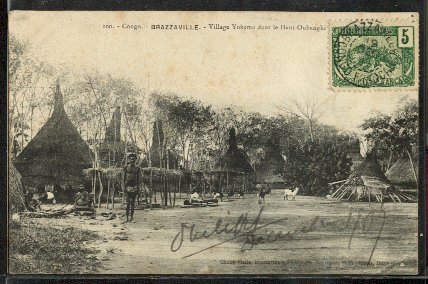Brookland Daily Eagle: Tells of their voyage to
the Congo, traveling with cannibals.
NOV 19, 1899; Page 27
go back... - or - Download a pdf - or - Next Article
|
AMOUNG AFRICAN CANNIBALS
At last we reached the River Ituri and following along the banks until it navigable,
we came to the great Bangwa district of the Aruwimi. Here were fresh sights anf more excitement.
Having procured canoes, I sent my porters back, retaining only three faithful boys.
Our boatmen were the notorious cannibals of the Aruwimi; very different from the Pygmies;
these were fine stalwart men, many of them considerably over six feet,
carrying themselves with the most aristocratic bearing imaginable.
As canoe men they could not be excelled. Each boat contained from ten to fifteen men who with their long,, tapering
paddles, made the heavy dug-out literally dance through the water. It was a most delightful sensation, after toilsome
pain of the walking through the thicket, to be comfortably reclining while whizzed along at about eight miles an hour,
for the current being strong in out favor, we often made quite that speed. One sat all day gazed along the banks
of the marvelous river. Sometimes elephants sporting themselves in the shallow water near the bank would for a moment
or two, be visible; forest antelope, too were often seen having their evening drink.
While the monkeys chattered in the trees and screamed at us as we passed.
|
The villages of the Bangwa were most curious, the houses consisting of tall cone shaped structures attaining a height of from fifteen to twenty feet. As we approached, the drums announced us and crowds of natives, naked cannibals, came to the river banks to watch us. Every warrior carried his knife and spear both most deadly looking weapons, and when I landed they almost surrounded me, walked round and round looking me up and down no doubt counting the possibility of a good meal.
Their language was strange to me, or I might have heard some extraordinary remarks; as it was, their hungry looks were quite enough to make me feel a little uncomfortable at times. I was generally able to find as interpreter, who would inquire of the people for men for a suitable place to pitch my tent, and this was most courteously given by the chief himself, generally in the middle of the village. Sometimes they would bring me quantities of food, seat potatoes, bananas, jams, etc. and in exchange I gave them little trinkets, such as beads, whistles, knives, etc. Fifteen days paddle on the river brought us to Baseke, the chief station of the Belgians on the Congo. From hence the steamers ran to the coast, and while after waiting a few days we arrived and I procured passage. - Brookland Daily Eagle Nov. 19, 1899
|
Would you like to go back...
or return to home page? click here.

 Native Canoe men
Native Canoe men
